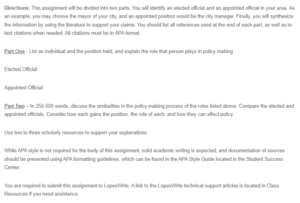Elected vs. Appointed Officials Role in Policy Making
Part One
Individuals, positions held, and roles in policymaking list
Elected Official:
Eric Johnson
Mayor
Role in policymaking
- Recommending policies to the council
- Vetoing legislation
- Breaking tie votes
Appointed Official:
T.C Broadnax
City Manager
Role in policymaking
- Making policy recommendations
- Providing suggestions on policy improvements based on public interest
Part Two
Policymaking process similarities of the roles listed above
The four dimensions of municipal governance that both appointed and elected officials are involved in are policy, mission, management, and administration. Elected officials, however, dominate in the formulation of the mission, and city managers control management and administration. The power in policy formulation is shared between the appointed and elected officials. According to Zhang & Feiock (2009), city managers greatly influence policymaking when they have a high level of professional expertise and are willing to share their administrative power with elected officials.
The policymaking process includes a set of activities such as problem identification, initiating policy discussion, recommending policy options, preparing policy proposals, making policy decisions, and deliberating on policy proposals. A strong mayor may dominate the entire process, but in most cases, the elected official has to rely on the assistance of an appointed official to make policies (Fenwick & Johnston, 2020). However, in some instances, city managers may lead policymaking from the initiation of policy deliberation and leave the final decision to the council members. Elected officials also have the formal authority to vote on policy decisions. They own the institutional and political legitimacy to make policies but may lack expertise on policy issues, hence being unable to make rational decisions in the community’s best interest (Zhang & Lee, 2011). On the other hand, city managers do not have the political legitimacy to make policies, and they also lack the institutional authority to vote on policy decisions. They, however, have the professional expertise and public values required to make policies hence supplementing political bias and the knowledge possessed by elected officials.
The difference in the role of a city manager and a mayor in policymaking may be attributed to the difference in their leadership role and how they gain their positions. A city manager is appointed by municipal councils or the mayor and works outside the political realm to ensure that operations in the municipality are run smoothly. Appointments are made based on an individual’s education level and experience in local government. In contrast, a mayor is elected by the people in a municipality to represent them and ensure that their needs are met (Fenwick & Johnston, 2020). Both officials provide local government services while maintaining policy transparency and securing taxpayers’ money. The main roles of the mayor are to preside at council meetings and act as the head of the city council in various ceremonies, while the main roles of the city manager are to plan, manage, direct, and review all operations and activities of the city. This includes coordinating services, programs, and activities among various departments in the city and outside agencies, ensuring the municipal organization observes financial integrity, representing the city’s interests by recommending policies that could improve the city and implementing strategic plans aimed at improving the city.
In conclusion, city managers can therefore affect policy by poorly implementing the policy’s requirements or rejecting it if it does not safeguard the people’s interests. Mayors can also influence policy by rejecting it or providing recommendations to replace a policy if it does not favor the city’s development. Therefore, effective policy formulation relies on the collaboration between the mayor and the city manager.
References
Fenwick, J., & Johnston, L. (2020). The role of elected mayors: Findings and analysis. Leading Local Government: The Role of Directly Elected Mayors, 91-118. https://doi.org/10.1108/978-1-83909-650-120201010
Zhang, Y., & Feiock, R. C. (2009). City managers’ policy leadership in council-manager cities. Journal of Public Administration Research and Theory, 20(2), 461-476. https://doi.org/10.1093/jopart/mup015
Zhang, Y., & Lee, R. (2011). City Managers in Local Policy Making: Responsibilities, Frustrations, and Legitimate Concerns [Paper presentation]. Public Management Research Conference.
ORDER A PLAGIARISM-FREE PAPER HERE
We’ll write everything from scratch
Question 
Directions: This assignment will be divided into two parts. You will identify an elected official and an appointed official in your area. As an example, you may choose the mayor of your city, and an appointed position would be the city manager. Finally, you will synthesize the information by using the literature to support your claims. You should list all references used at the end of each part, as well as in-text citations when needed. All citations must be in APA format.

Elected vs. Appointed Officials Role in Policy Making
Part One – List an individual and the position held, and explain the role that person plays in policy making.
Elected Official:
Appointed Official:
Part Two – In 250-500 words, discuss the similarities in the policy-making process of the roles listed above. Compare the elected and appointed officials. Consider how each gains the position, the role of each, and how they can affect policy.
Use two to three scholarly resources to support your explanations.
While APA style is not required for the body of this assignment, solid academic writing is expected, and documentation of sources should be presented using APA formatting guidelines, which can be found in the APA Style Guide located in the Student Success Center.
You are required to submit this assignment to LopesWrite. A link to the LopesWrite technical support articles is located in Class Resources if you need assistance.